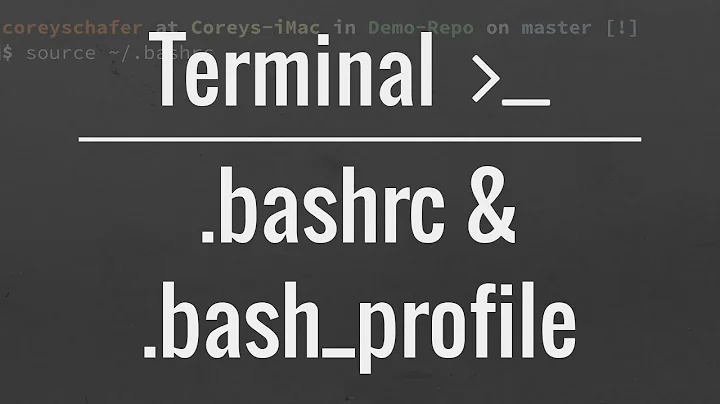What useful things can one add to one's .bashrc?
Solution 1
I have a little script that extracts archives, I found it somewhere on the net:
extract () {
if [ -f $1 ] ; then
case $1 in
*.tar.bz2) tar xvjf $1 ;;
*.tar.gz) tar xvzf $1 ;;
*.bz2) bunzip2 $1 ;;
*.rar) unrar x $1 ;;
*.gz) gunzip $1 ;;
*.tar) tar xvf $1 ;;
*.tbz2) tar xvjf $1 ;;
*.tgz) tar xvzf $1 ;;
*.zip) unzip $1 ;;
*.Z) uncompress $1 ;;
*.7z) 7z x $1 ;;
*) echo "don't know how to extract '$1'..." ;;
esac
else
echo "'$1' is not a valid file!"
fi
}
Solution 2
Since I use so many different machines, my .bashrc always sets the command prompt to include, among other things, the name of the server I am currently logged into. This way, when I am three levels deep in telnet/ssh, I don't type the wrong thing in the wrong window. It really sucks to rm -rf . in the wrong window! (Note: At home, telnet is disabled on all machines. At work, ssh is not always enabled and I don't have root access to very many machines.)
I have a script ~/bin/setprompt that is executed by my .bashrc, which contains:
RESET="\[\017\]"
NORMAL="\[\033[0m\]"
RED="\[\033[31;1m\]"
YELLOW="\[\033[33;1m\]"
WHITE="\[\033[37;1m\]"
SMILEY="${WHITE}:)${NORMAL}"
FROWNY="${RED}:(${NORMAL}"
SELECT="if [ \$? = 0 ]; then echo \"${SMILEY}\"; else echo \"${FROWNY}\"; fi"
# Throw it all together
PS1="${RESET}${YELLOW}\h${NORMAL} \`${SELECT}\` ${YELLOW}>${NORMAL} "
This script sets the prompt to the host name followed by :) if the last command was successful and :( if the last command failed.
Solution 3
Color for manpages in less makes manpages a little easier to read:
export LESS_TERMCAP_mb=$'\E[01;31m'
export LESS_TERMCAP_md=$'\E[01;31m'
export LESS_TERMCAP_me=$'\E[0m'
export LESS_TERMCAP_se=$'\E[0m'
export LESS_TERMCAP_so=$'\E[01;44;33m'
export LESS_TERMCAP_ue=$'\E[0m'
export LESS_TERMCAP_us=$'\E[01;32m'
Colored manpages can also be obtained by installing most and using it as MANPAGER env variable. If you want to use this pager not only for man, use the PAGER variable, like this:
export PAGER="/usr/bin/most -s"
Solution 4
No more cd ../../../.. but up 4
Goes up many dirs as the number passed as argument, if none goes up by 1 by default (found in a link in a comment in stackoverflow.com and modified a bit)
up(){
local d=""
limit=$1
for ((i=1 ; i <= limit ; i++))
do
d=$d/..
done
d=$(echo $d | sed 's/^\///')
if [ -z "$d" ]; then
d=..
fi
cd $d
}
Solution 5
I deal with a lot of different machines so one of my favorites is aliases for each machine that I need to frequently SSH to:
alias claudius="ssh dinomite@claudius"
It is also useful to setup a good .ssh/config and ssh keys to make hopping amongst machines even easier.
Another one of my favorite aliases is for moving up directories:
alias ..="cd .."
alias ...="cd ../.."
alias ....="cd ../../.."
alias .....="cd ../../../.."
And some for commonly used variations of ls (and typos):
alias ll="ls -l"
alias lo="ls -o"
alias lh="ls -lh"
alias la="ls -la"
alias sl="ls"
alias l="ls"
alias s="ls"
History can be very useful, but by default on most distributions your history is blown away by each shell exiting, and it doesn't hold much to begin with. I like to have 10,000 lines of history:
export HISTFILESIZE=20000
export HISTSIZE=10000
shopt -s histappend
# Combine multiline commands into one in history
shopt -s cmdhist
# Ignore duplicates, ls without options and builtin commands
HISTCONTROL=ignoredups
export HISTIGNORE="&:ls:[bf]g:exit"
That way, if I know that I've done something before but can't remember the specifics, a quick history | grep foo will help jog my memory.
I often found myself piping output through awk in order to get a certain column of the output, as in df -h | awk '{print $2}' to find the size of each of my disks. To make this easier, I created a function fawk in my .bashrc:
function fawk {
first="awk '{print "
last="}'"
cmd="${first}\$${1}${last}"
eval $cmd
}
I can now run df -h|fawk 2 which saves a good bit of typing.
If you need to specify a delimiter (e.g., awk -F: for /etc/passwd), this function obviously can't handle that. The slightly-overhauled version in this gist can handle arbitrary awk arguments before the field number (but still requires input from stdin).
Related videos on Youtube
Gareth
There is no excellent beauty that hath not some strangeness in the proportion. - Sir Francis Bacon (1561 - 1626)
Updated on September 17, 2022Comments
-
Gareth almost 2 years
Is there anything that you can't live without and will make my life SO much easier? Here are some that I use ('diskspace' & 'folders' are particularly handy).
# some more ls aliases alias ll='ls -alh' alias la='ls -A' alias l='ls -CFlh' alias woo='fortune' alias lsd="ls -alF | grep /$" # This is GOLD for finding out what is taking so much space on your drives! alias diskspace="du -S | sort -n -r |more" # Command line mplayer movie watching for the win. alias mp="mplayer -fs" # Show me the size (sorted) of only the folders in this directory alias folders="find . -maxdepth 1 -type d -print | xargs du -sk | sort -rn" # This will keep you sane when you're about to smash the keyboard again. alias frak="fortune" # This is where you put your hand rolled scripts (remember to chmod them) PATH="$HOME/bin:$PATH"-
Toro about 15 yearsThis should be community wiki
-
Gareth about 15 yearsTurned into community wiki. Enjoy.
-
derobert about 15 yearspiped to more? I bet you'd be happier with less or less -F
-
GreenKiwi about 15 yearsExcept that there is that "sort" before the more, since sort needs the full input, the less -F would just let you see the sorting faster, and I bet it's pretty dang fast.
-
fmccardoso almost 15 yearsLOL, love the ' alias frak="fortune" ' line, I'll remember that one when S#!T hits the fan
-
SergioAraujo over 12 yearsshow path
alias path='echo -e ${PATH//:/\\n}' -
F. Hauri almost 11 yearsThat's a nice thread, but for superuser.com
-
-
Gareth about 15 years@chaos "How many aliases to fortune do you need, anyway?". woo for win. frak(and alternate spellings) for fail.
-
Gareth about 15 yearsAgreed regarding memorising long useful commands. I find though that I'm running 'diskspace' fairly often on runaway servers (i.e. php is coredumping all over the place).
-
pjz about 15 yearsyeah, I actually have something similar to that (du /home/* --max-depth 1 | sort -n >/home/.sizes ) run nightly so I can keep a rough eye on my users' space consumption on the big shared machine.
-
 chaos about 15 yearsPlease follow these steps. 1) Extend your PATH in your .bashrc. 2) Type 'bash'. 3) Type 'echo $PATH'. 4) Type 'bash'. 5) Type 'echo $PATH'. 6) Punch yourself in the head for ignorantly downvoting and insulting people because they know more about sysadmin best practices than you.
chaos about 15 yearsPlease follow these steps. 1) Extend your PATH in your .bashrc. 2) Type 'bash'. 3) Type 'echo $PATH'. 4) Type 'bash'. 5) Type 'echo $PATH'. 6) Punch yourself in the head for ignorantly downvoting and insulting people because they know more about sysadmin best practices than you. -
krx about 15 yearsI am impressed that you have a slightly valid reason, not going to punch myself in the face though. Its easy to get non-login shells where your path was not already extended. I take back that its dumb, I originally read it that you were trying to say you should not set important variables in your .bashrc or something.
-
Gareth about 15 yearsPerhaps someone should start a "Should I set my PATH variables in the .bashrc or .bash_profile"?
-
 chaos about 15 years@Ian Kelling: What I'm actually saying is that operations that should be performed once per login belong in .bash_profile and operations that should be performed once per shell instantiation belong in .bashrc.
chaos about 15 years@Ian Kelling: What I'm actually saying is that operations that should be performed once per login belong in .bash_profile and operations that should be performed once per shell instantiation belong in .bashrc. -
Gareth about 15 yearsNice. Again though, there's that IDE/Vim argument regarding know the commands from memory. Fantastic bit of script though. Definitely going in the .bashrc Cheers!
-
dr-jan about 15 years\w should give you the full pathname (unless you're within your home directory hierarchy when '/home/me' becomes '~' for example :-)
-
hookedonwinter about 15 yearsIt's the "except for" bit that I don't use \w. :-)
-
derobert about 15 yearsThe $? check is a pretty neat idea, I like it.
-
Sander Marechal about 15 yearsThere's a nice and simple linux command called "unp", the Unpacker that does this and more.
-
Dan Udey about 15 yearsIf you set your login shell to be screen (and configure e.g. bash in your .screenrc), then whenever you SSH in, screen will automatically try to reconnect to disconnected screens. If that fails, it will create a new screen.
-
baudtack about 15 years@Dan Udey I haven't tried what you suggested myself, but the bash I posted will start the screen only on ssh logins were as setting screen as your login shell, would also start it on local logins. Which maybe what you want. It's just not what I want. :-)
-
Annika Backstrom about 15 yearsYour HISTCONTROL lines override each other, since it's just a shell variable. ignoreboth combines ignorespace and ignoredups.
-
devin about 15 yearsI use the ssh alias and ssh keys too... it makes every so easy
-
 Léo Léopold Hertz 준영 about 15 years@Andrew: I run your first code unsuccessfully in OSX. It breaks my Prompt settings.
Léo Léopold Hertz 준영 about 15 years@Andrew: I run your first code unsuccessfully in OSX. It breaks my Prompt settings. -
pgs about 15 yearsI also show the status in my prompt, but keep the numeric value and colour it red if non-zero, otherwise green.
-
 Léo Léopold Hertz 준영 about 15 yearsThe command has one missing feature. It cannot open 7z package at boost.org/doc/libs/1_39_0/more/getting_started/… correctly. Do you know how to solve the problem?
Léo Léopold Hertz 준영 about 15 yearsThe command has one missing feature. It cannot open 7z package at boost.org/doc/libs/1_39_0/more/getting_started/… correctly. Do you know how to solve the problem? -
Toby about 15 years+1 for the
export IGNOREEOF="2" -
Rene Saarsoo about 15 years+1 for the history control tips.
-
 David Z almost 15 yearsYou could make 1up print a mushroom in ASCII art, just for kicks ;)
David Z almost 15 yearsYou could make 1up print a mushroom in ASCII art, just for kicks ;) -
Rev316 over 14 yearsWorks fine here (10.6.X)
-
Mayur Bhayani about 14 yearsNewer versions of tar detect automatically the archive type, so can extract all supported formats by just 'tar xvf'.
-
user2910702 almost 14 years@Sander dtrx isn't bad at that either. It makes sure the archive extracts to its own subdirectory.
-
user2910702 almost 14 yearsI like your
history -ptrick. -
user2910702 over 13 yearsIt's easy enough to deploy your custom configuration on systems you regularly use, though.
-
Kish about 12 yearsWill this alter the $? variable after running the command or does it still have the value produced by the last command run?
-
Rqomey almost 12 yearsDo you also encrypt your history in that case? Why not encrypt your $home
-
Smyrnian almost 12 yearsWhile almost all of the answers refer to tweaking history, I haven't seen any which enable timestamping which can be useful.
export HISTTIMEFORMAT='%F %T ' -
Sirex over 11 yearsyou can put hostname aliases in .ssh/config to the same effect. In this case, add an entry 'Host cloudius' with 'username dinomite'
-
 imapollo about 11 yearsInteresting....
imapollo about 11 yearsInteresting.... -
 jwbensley about 11 yearsJust as a follow up to you ssh alias, this is something I do all the time. I always do this with the IP though in case of DNS outage.
jwbensley about 11 yearsJust as a follow up to you ssh alias, this is something I do all the time. I always do this with the IP though in case of DNS outage. -
 jwbensley about 11 yearsIf you are worried about disconnects, check out mosh, I use it all the time and highly recommend it: mosh.mit.edu
jwbensley about 11 yearsIf you are worried about disconnects, check out mosh, I use it all the time and highly recommend it: mosh.mit.edu -
Matthew G over 10 yearsatool is a package that includes the commands apack and aunpack. They provide a convenient and consistent interface regardless of what the archive type is, and don't need any extra bash functions.
-
Matthew G over 10 yearsThis version of up() seems unnecessarily complex. I use this version: up() { cd $(eval printf '../'%.0s {1..$1}) && pwd; }. You can remove the call to 'pwd' if you wish obviously.
-
 Matt Kenefick over 9 yearsI use something like this: # Directory navigation aliases
Matt Kenefick over 9 yearsI use something like this: # Directory navigation aliasesalias ..='cd ..' alias ...='cd ../..' alias ....='cd ../../..' alias .....='cd ../../../..'




